Vibing on vibe coding
Me myself and AI. Am I coding again, or just deluding myself?
“In all affairs, it’s a healthy thing now and then to hang a question mark on the things you have long taken for granted.” - Bertrand Russell
“Just because you’re paranoid doesn’t mean they aren’t after you.” Joseph Heller - Catch 22
TLDR;
Hi, my name is Rich and I’m a vibe coder.
I hate the term but I love the superpower. Modern coding assistants grant abilities akin to relocating from Krypton to the yellow sun of earth. Especially for the curious later career technologist who has lost sleep that a lack of recent hands on building clashes with their childhood identity. Though at first you can feel like you’ve lost the instruction manual for your super suit1.
Today is part memoir and part (hopefully) useful observation about modern coding tools. It’s also a call to arms to try it - especially if you loved to build but now throw up your hands at the IDE muttering “OMFG - which packages do I need to install again?”
I thought it might just be me. But as I speak with technologists of my generation they’re all dancing around like the folks in Cocoon after swimming in that alien infected pool. Though most younger than most of those actors except for (checks notes) Wilfred Brimley2?
I’ve been reading listening to Vibe Coding by Gene Kim and Steve Yegge who make the same observation about AI bringing people back to coding who’d gotten off the train long ago. Perhaps, given the current state of the job market it’s unclear we need more people coding in the workforce - but I have to admit it feels damn good to get the rush of building without having to spend the next century figuring out which set of packages I need to install to do _____ with Python, while also trying to learn 3-4 new hot languages. Just don’t need that validation of knowing every bit of arcana anymore. I mean I coded for money in assembler and C - so dammit - get off my lawn!! ;-)
For more practical information you should probably checkout Vibe Coding: Building Production-Grade Software With GenAI, Chat, Agents, and Beyond3 and follow Gene and Steve’s budding podcast and publishing empire. It’s paints the big picture with great enthusiasm, while also giving practical frameworks for working with the current (imperfect) state of the art. I’m unclear how much I’m going to add to the discussion beyond them - they even have an excellent metaphor involving The Swedish Chef and agentic coding gone wild. That’s hard to compete with.
Even so I wanted to get all of this stuff out of my head. Selfishly, it’s cheaper than therapy for me, it helps me think, and if it helps someone out that would be awesome.
If you just want to see a summary of what I think is useful to remember about this brave new world then skip to the summary section at the end. You’ll miss out on the journey as well as a few pop culture references - but there’s usually a price for efficiency.
A few quick caveats
Working with agents to code is fun and at least for what I’ve tried super productive. That includes small mobile apps, new domains such as VR, and dives into complex code bases. In the more complex cases the AI alone is not sufficient - I had to engage with it aggressively as I would with a senior (and occasionally) junior colleague. Otherwise it could make assumptions that were incomplete - though to be fair so could I. This was actually what made it so much fun. Attempting to one-shot something even remotely complex did not work in the real world. At least for me.
What I really don’t have insight into is how well would 50 developers running their own crews of virtual partners do in a moderately to complex codebase? Without deep thinking and guardrails I suspect anarchy would reign. Having things structured to support this in the beginning will be as important as it is now for your company’s velocity to avoid grinding to a halt. Actually … maybe ten times more important.
Then there’s Vegas fallacy - when everyone who goes to a casino seems to feel they’re a winner. I’m not sure how exists in a world of loss aversion - but I’m pretty sure most folk remember the times they won and don’t net out their actual losses. Coming away thinking they did better than they really did. That’s definitely possible with vibe coding. Even though I’m pretty sure the results I’ve had so far are hugely net positive, depending on your situation, your background, and your codebase mileage may vary. It’s worth taking notes about the ups and downs vs. just leaning “did that go well?” to your memory.
The professional fountain of youth?
Some time ago I posted “I’m thinking I’m back.” This was 90% to get silly John Wick references out of my system, and 10% to signal to myself and others that after a much enjoyed sabbatical I was re-entering the technical arena. I wasn’t sure what that re-entry would look like, and I’m still honestly not sure. At the time I was thinking either a traditional job or maybe a period of consulting/advising.4
In the meantime I’d planned to do something I always enjoy but often don’t often get to do as a primary focus - work hands on on actual technical tasks. Sure there are the moments I’ve gone rogue with something here and there. Early on in my Amazon career I built a live code white-boarding tool because I was tired of hearing people read code over the phone5. The Amazon Video team ran a little wild with it for a time before legal got wind of the whole thing6. Once in a while something like that will happen - but truth be told, it’s been more than a minute since I’ve done more technically than read on the side and brainstorm with people in the office.7
The days of staying up to 3am because I just wanted the processor to boot from the EPROM or the code to compile and run or whatever have been in my rear view mirror. Lost was the incredible, indescribable joy of seeing the right lights flash on your development board at 3:05am when things finally click.
Consulting/advising and maybe a full time leadership gig sound good - but at least in the interim modern technology maybe has presented a third option - building stuff again. For me - more importantly it also exposed a way to turbocharge how one approaches those jobs traditionally. This article is partially a rundown on what I’ve been up, maybe some learnings other might find useful, and an open dialog with myself as to where all this is going. Based on a lot of conversations I’ve had, and comments in Vibe Coding I’m far from the only technologist jumping back into development and having a blast. I plan to write more in the future about how I feel agentic coding can (and should) change work as a technical org leader/guide.
Spoiler alert: it’s all been a hell of a lot of fun, I somewhat have to wrestle with the identity question as to at what point of developer abstraction am I “not really coding”, and the unsettling feeling that what’s great now could become apocalyptically challenging for the professional later. I suppose that’s where the double edged nature of “may you live in interesting times” comes from.
I’m not sure of anything really - except that the times are indeed interesting (and a changing). Thanks for joining me for the ride.
Have you heard the good word about agentic coding tools?
There had been all this talk about AI assisted “Vibe” coding and I did try it out relatively early on. I found it pretty amazing as I went from Bolt and later to Cursor.
As described in the recent book Vibe Coding I had my own revalation moment while checking out Cursor for the first time. I’d built some toy problems in Bolt and had downloaded but not tried Cursor. Then in an earlier article I’d made a bunch of AI generated video - but wanted to create a new aggregated display frame to represent the scene. I could describe what I wanted (“go through the video and grab a still at each cut scene and then do a 3x4 grid image that combines them”). I figured there was a universe in the multi-verse where I could bang out a script to do that - but that earth wasn’t this one. I figured (quoting my dad) “what could it hurt?” to try Cursor’s new agentic capability and see if it could serve as an interdimensional portal.
I gave Cursor it’s shot and my mouth must have been agape for at least 30 seconds at the result. I was looking at a jpg created as I’d wanted what I asked from the input video. From roughly the prompt above Cursor8 had built an app that opened a file selector, let me choose a movie file, skimmed through it and output a composite image (letting me choose the destination). It wasn’t perfect but I explained roughly what I wanted (more clear differentiation between sampled frames - not just time based) and the system proposed an algorithm and after agreement from me knocked it out. Worked like a charm. Elapsed time: 15 minutes - probably less than it would have taken to convince myself that I couldn’t google up someone else’s already existing solution. Wow, just wow!
From there, I’d like to say that I dove deeper and deeper in agentic coding. But I was in an AirBnB in Florence at the time, so mostly I filed away my religious awakening and went back to our epic vacation.
Back in Seattle I decided to jump back in with terminal based coding with Claude Code. It seems even more removed than something integrated into an IDE, so I was again skeptical9. I sat down and thought for a while about an idea of something to built - not because I thought I had a groundbreaking product idea, but because doing a “hello world” app is pointless in this new world.
Long story short - before I knew it I was totally hooked. While I’m not expecting riches from any of the results so far I have been able to get a lot done across diverse surfaces. I list them just to share the variety, which still astounds me at times.
So far I’ve dabbled with a surprising degree of success into;
A blue/red glasses 3D application idea that I tried on Bolt. Bolt got it partway there but struggled. I’ve picked it up recently with Claude - but it still needs more work. Not surprisingly it’s gotten stuck on the proper rendering of anaglyphs. Which is pretty fair - it’s similar to an example in Vibe Coding where veteran devs ask an AI for a complex distributed cache and then flip the bozo bit when it doesn’t work with a one shot prompt. I purposefully chose something that seemed impossible and it’s actually pretty close to working. Once I have time to manually debug or better prompt the rendering expectations I believe it with unlock much of my original vision. Semi-pro tip though - start with something you could picture building yourself and that doesn’t seem so super niche.
An iOS/Android app that implements an image data capture workflow for a side interest. It’s a pretty basic workflow for something that doesn’t really need a mechanized aspect - in that it can be measured by hand with a camera app. I’ve explained the process to folks a few times and they didn’t quite grasp it. That made it a good candidate as proof of concept (of my ability to build and ship something). End result: a pretty solid app that I’ve tested on both Apple and Android devices and I’m working through shipping it to both apps stores hopefully over the next few weeks.
A website for the above mentioned app. Much slicker than I should have been able to build with my own web dev skills.
Another website - with a turbo charge on the building + content creation and visual design stuff. A solid, functional first version of a website for another idea I’m noodling on. Claude Code even helped me work through some ideas for payment processing I may or may not need in the future.
An app for the Meta Quest using the Unity framework. I’ve been thinking to try this particular idea for at least a year and a half - but baulked hard when I reviewed the pages and pages of setup for the Quest. I’d been diving into Unity back then (BTW - it’s so cool) and I think I spent a couple of weeks off and on trying out tutorials. Making a ball bounce and so on. In roughly the same period it took to have partial understanding of basic elements, with Claude Code I got what feels like solid bones for my original concept. I think what I have does about 80% of the value prop I had in mind. This work was way slower and occasionally more frustrating than a basic mobile app. Likely because Unity development seems less likely to have been a huge part of Claude’s training set. But even then, way faster than what would have happened left to my own devices10. As a nice benefit I have a way better understanding of Unity coding than I would have had in the same time as I truly partnered with Claude as we debugged “together.”
Oh - sorry, almost forgot the big one that made me a hardcore true believer in my partner Claude
While talking to a startup about a role they introduced a practical problem mid-process. I was down with this idea as talking through a real problem with potential teammates. Though I didn’t quite expect the actual assignment11. Which was, to summarize lightly, “hey - we have a 15+ year old codebase that is limiting us from doing like everything. Tell us what a re-architecture looks like?, how you’d in detail get every enumerated constituency onboard?, and show your work in terms of milestones/timelines/resources. Here’s a link to our Git Repo which has no documentation.” I was about to send them a quote for 3-4 weeks of consulting research instead of continuing the process12. ;-) But then I decided to see what sort of trouble me and Claude could get into on a weekend evening. More on that later. It’s worth the wait I think.
This list of “project” work doesn’t even refer to the many other practical workflows that Claude Code worked through as a partner with me. There seem to be many things it brings fluidly to (due to it’s agentic ability to access tools) vs more common direct chat interfaces. Wondering how to setup Google Analytics? - Claude as on it. Google Analytics only lets you do something by hitting an API? Claude will toss together a Python script to get you unstuck. Question about a companys tructure? Well, truthfully, ChatGPT’s chat client in deep research was a little bit more useful. But if you wanted to stay in the terminal environment Claude Code was willing to give it a go.
Basically though if there as something needing doing and I had the terminal window I’d role the dice. Let’s just say that when Anthropic hit me up for the more expensive than $20/month tier I didn’t think about it long. But maybe don’t tell them I said so…
I’m not claiming that anything I banged out is a $100 ARR company in the making. But the thrill is undeniable - and it’s very easy to feel at least like Kal-el’s more engineering oriented cousin in the warm sun. It’s a nice sensation.
But won’t coding with AI inevitably devolve into me being kicked out out of an airlock or something similarly bad?
Well - that’s the plot line from 2001 - A Space Odyssey and you’re not in outer space. So don’t be silly… AI isn’t going to actively try to murder you. At least not until mid 2028 when Skynet really goes online13. Though maybe don’t temp fate by setting up an MCP server to access both your gas line and electrical system simultaneously or the automated crossbow idea you’ve been working on14.
Kidding aside - you should be worried about all the things that your occasionally erratic partner can get up to. If you’ve ever worked with an intern who could grind out thousands of lines of code while not understanding the assignment15, or wondered if an engineer was joking when they said “don’t worry - I turned off all the alarming until I’m back from vacation”16, or hired a brilliant technologist with an notable lack of short and long term memory - then you can guess at the unpleasant things that can happen to your code base if you’re not paying attention. These can and will all happen if you don’t pay attention.
The good news is that if you’re follow some defensive in depth techniques, and don’t attempt to multitask watching Seinfeld reruns while working, the net results are likely to be positive. Depending on your codebase you may hit some diminishing returns - but just because your tractor can’t drag race17 doesn’t mean it doesn’t have tremendous value. The book Vibe Coding has some clear ideas on how to minimize pain for your future self/team. Reading that is a shortcut that would have saved me some time - though the best teacher is both reading the book and building some stuff on your own.
Just remember to verify everything. It can be funny when one of the following actual things happens;
In response to asking Claude something along the lines of “why do you think ____ to be true?” you get an explanation that starts with “ISSUE: I likely made this up - need to verify or remove.”
When Claude Code suggested adding some computer vision analysis to a problem we were working on - but then mentioned when eye detection failed something remarking “hmmm - normally the eyes are about there relative to the head.” Causing me to ask “how are you detecting the pupils? Are you using a CV algorithm or just guessing?” only to get back “There’s ZERO actual computer vision happening - no pixel analysis, no edge detection, no pattern recognition. It’s just mathematical guesswork based on typical selfie composition.” Props for the admitting when busted - but not exactly confidence inspiring.
When I noticed that Claude had written up custom functions in Unity for just pointing at a menu button I challenged it to use core functionality instead of doing something custom. When the sheepishly written basic code failed it’s first several excuses were that often Unity (possibly the most popular platform for 3D game development) didn’t have reliable item selection. That seemed unlikely. Now to be fair - I’ve had similar discussions with engineers I’ve been equally skeptical of.
Many, many other similar situations that were too evocative of your clever 5 year old. Who for a second seems credible when they tell you with great confidence something obviously untrue, but who cave upon the slightest inspection of reality.
These are all funny at first. At least when compared to the horror stories you’ve heard of a coding agent wiping out a Git repo18 But still not that funny if you were just in some bizarre 2025 LLM coding version of Who’s on First that went in circles for days. Been there, done that, would prefer to return the t-shirt.
As an example of something that caused swirl … even if you repeatedly tell your partner to
assume Unity has working functions for basic things like selecting objects in a scene
Do not assume baseline functionality is broken and write your own from scratch
verify reality in code before making assumptions that inform your planning
Do not check things in until you’ve confirmed they work, and
Stop freaking writing sentences like “now we’ve have a working professional grade interface” after botching something 10 times in a row19.
It may in a (“I can’t hear you”) passive aggressive way keep conveniently forgetting to do so. And when I say “may” I mean “very often will”.
You’ll want to practice defensive coding, excellent testing - and finally give test driven development (TDD) an honest try. It turns out that guy you worked with who literally wouldn’t shut up about it was 100% onto something. Even if slightly ahead of their time.
What has to be to to maximize velocity of this rocket ship?
I had a great conversation with friend20 a week ago. He was talking about what he saw as a huge advantage of startups building today. It wasn’t for the reason you see freaking everywhere on LinkedIn about the one person dev shop rocketing to $1B due to their super powered AI coding chops. Instead his thoughts centered around the observation that if you’re building your codebase now you could focus on the things that really enable a team to get maximum leverage21. Whereas even a startup 2-3 years old might have an architecture working as a headwind.
Of course I was curious what that enablement meant to him. What I recall him sharing fell into the following buckets (as I nodded my head along with him);
The right language was selected to really lean into what AI knows. This seems super valid as the distribution of training data for models is not uniform across all languages and systems. Even polyglots have limits.
Your system should be loosely coupled, and modular with a clear separation of concerns. AI seems like magic, but even frontier models hit limits of memory context if you push hard and long enough. Being able to reason about separable things should help a lot.
Breaking the work units down into digestible chunks. Working with the AI to developed each phase: product doc -> tech spec -> design. You can “vibe” - but you should still break work down. One-shot success is an urban legend.
Automation first focus including strong CI/CD pipelines and testing. This one enables a lot of velocity because it combines the benefits of being paranoid (which I think we all agree on) and as the Vibe Coding book points out it quickly becomes inefficient to feed errors back to the models manually.
Code reviews (using AI). Interestingly enough (and Vibe Coding gets into this) asking a coding agent to judge another coding agent (even if they’re the same agent) tends to make things better iteratively. Due to the somewhat stateless nature of models it’s as if you get the “external viewer” benefit even if you think the model is just regressively investigating itself.
If you’ve been coding professionally before you might be thinking:
Hey - aren’t these the things that we were always supposed to be doing? .
Well, yeah - pretty much. But it’s still 100% on the money. If you’re in the middle of a one of those “crap - everything is too slow and we need to stop and refactor” moments AI can help. But - if you’re starting clean the payoff for being deliberate in how you build vs. a moving super fast and dealing with the consequences later22 may be a LOT higher than it used to be.
I can’t help thinking that when these best practices become the existential keys to unlocking big velocity bumps it could result in better long term code that we would have had otherwise. At least for organizations who understand that the importance of good hygiene is way higher without high judgment humans. A contrarian (if unrealistic) take on vibe coding code quality.
Don’t take this to mean you can avoid the hard work of discovering great goals grounded in a future reality that brings values to customers. But it does mean that if you’ve been paying attention to software development for 5 years, or 10, or forty - what you’ve learned about high performance teams still matters (minus many of the syntax requirements and the debates about tabs vs. spaces - thankfully). Or maybe in other words:
The startup codebase deep dive that ended with a Boscht Belt joke
When you’re gaining confidence in a technology there’s a point where you go from “wow, that’s pretty cool” to “holy shit! even if this never gets better this is gonna make things … just freaking wow!” I’d been pretty happy with the apps and website I’d worked on with agentic tools - the fun factor was high and I felt a surge of familiar “builder” energy. But I wasn’t sure how that ability would scale into a system that was … let’s say … a big more grizzled and long in the tooth.
Two months back I’d been speaking with a Senior Principal Engineer at Amazon - just shooting the shit about coding agents. He felt that his experience showed a sharp starting acceleration (going from 0-60), and then some leveling off. Which meant - maybe not 10x velocity forever. But one thing he was 100% convinced about was the ability to pickup a new codebase and get a sense of what’s going on a bazillion times faster than before. This was recently on my mind as I spoke to a founder about possibly doing some due diligence on behalf of his potential investors. But I hadn’t really gotten a chance to take the car out for a spin for real before that startup’s “job interview” assignment came in.
I was sitting around that Sunday night staring at the two page “prompt” that was intended to inform an hour discussion later in the week. I’d been waiting to see what other info was going to be forthcoming and it was starting to look like all I was getting was a link to their Github. I figured I’d stew a bit over the remains of the weekend and share wherever I landed on Monday. But before dinner I remembered that Amazon Sr. PE conversation and thought “well, I have the repo access and a while ago I figured out how to let Claude use my access keys. I wonder what Claude could do?”
Figuring it was all upside in terms of learning I turned Claude Code free on the codebase. Just focusing on it getting a handle on things and asking it to teach me about the architecture. I didn’t (at least for the first few hours) share the “assignment” - though I eventually did in the interest of partnership. :-)
I could see the repo was extensive but I didn’t look at the core status until just now. Upon some investigation I’ve realized the starting point was a link to” around 2.5k C# files, with about 420k lines of code. Information about their database setup with over 54 tables, and 1400 lines of SQL schema definitions. Plus a front end system with 200 or so Javascript files (and other stuff). In total about half a million lines of code over 750 files across 15 years of check-ins. Also - I’m not sure I’ve ever written a production line of C#.
While I’m still in discussions about my analysis and not 100% sure of the conclusion I think I was able to make remarkable progress. Understanding the general architecture, finding inconsistencies in my (and Claude’s) assumptions, asking 4 or so emails worth of short questions to a staff member at the company, and then feeling like I was able to zero in on the core problem that was bottlenecking them.
In a 15 year codebase there’s always going to be things that are making progress feel slow. Initially I thought the issue was the remarkably high level of separated databases in what was organically a multi-tenant system. But due to Claude’s ability to review both broadly and deeply, with a power assist from my questions (both to Claude and a human answering our emails) we zoomed into an unexpected conclusion.
Diagnosis: A well architected monolith where within 400 lines of key code there was a (likely) tractable problem. Users given the ability to take an action which due to tight coupling broke production integrations. Leading to me also learning Claude has a sense of humor (and also perhaps now I understand now how people end up in “relationships” with AI).
I’m optimistic that the hour or so work “we” did beyond this point has identified a surprisingly narrow surface that will allow a structural fix. Enabling option value on which older portions of the code they can work on next - maximizing customer and business value rather than be stuck at “crap, we’re spending all this time fixing random breaking things that is hurting trust with customers.”
Do the engineers on the team already have this clarity? Maybe, probably - but that’s not the point. Could a deep dive like this have happened a few years ago into a codebase of this size, absent documentation and access to hours and hours of lessons from the legacy system’s most experienced engineers? Nope - I think not.
Total time for me invested: about 8 hours - all of which were some of the most fun I’ve had in a long time.
In summary
Shortest summary: Pay for Claude Code (or Cursor, or Amp, or almost any first order tooling). In parallel read Vibe Coding or some equivalent voice slightly from “the future” whose been playing with coding agents and isn’t just a hype jockey.
While you’re playing remember you can more easily do all the best practices you’ve known you should be using but likely skipped a few of most of the time.
Write down success first - in the world of the customer (or financial needs of the business)
Break down your success into clear, verifiable definitions
Write out how you’ll evaluate correctness (functionally what will you check)
Write tests to do that checking continuously
Design out your architecture in pieces that takes visibility and modularity and separation concerns and all that stuff into account. Use AI as a partner. Just don’t always trust it without checking. Be extra skeptical and challenging if you’re unsure. One nice aspect of AI is it doesn’t get defensive if you ask aggressively - so you don’t have to focus on just “what” and “how” questions.
Maintain up to date documentation and continuous integration/building that uses all that TDD stuff. AI can help write documentation - at least in the sense to help it rebootstrap in new sessions what it was thinking. Remember - if you don’t help it the current generation of tools are super forgetfull.
Automate as much as possible so that manual testing is minimized. Think puppeteer for UI, MCP servers for your IDE or Unity install.
Ensure code reviews happen. People are good - so is AI. Github has some pretty amazing tools I’ve not scratched the surface of that allow automated PR reviews by Claude (and I assume other models).
Keep auditing that things are as you think they are. Trust but verify. Paranoia will not destroy you.
Have fun and stay focused on the long term user problem
Monitor shit - seriously - paranoia is your BFF. Worth saying twice in one list.
While building try more ideas out (multi tracking) vs just committing to one problem solution path before you have all the data to make an informed (good) decision
Enjoy the ride.
Used properly you can learn from new ways of building and try to avoid, or at least forestall the GPS dumbification problem. Before GPS if you wanted to go somewhere new you used a map. Or if you weren’t a stereotypical man you’d get close to your destination and then ask a local for directions. But nowadays if you’re like most people you may find yourself checking how to get somewhere with your phone even if you’ve been there a number of times before. Similarly - depending when you met your partner or BFF you might not be able to recall their phone number. Used badly coding agents have this same trap. But my take so far is that used with even a smidge of paranoia and curiosity you can learn a ton about being a better engineer while they take over for us. ;-) The choice is yours.
Thanks for reading to this point. I truly appreciate your attention. If you found this valuable or just fun to read - please consider sharing with a friend. Look forward to reading about your experiences in the comments section.
Yeah, yeah, yeah. I have somewhat intentionally blended Superman references with the more obscure plot of The Greatest American Hero. If you’re not familiar with the latter, it’s the sort of 80’s era weirdness that could get on the airwaves while executives weren’t paying close attention or were doing endless lines of cocaine (I assume). It’s another one of those shows that after explaining the plot to my bemused daughter I had to wonder “did I actually just imagine that having happened?” Also falling into that category was Airwolf and the afternoon between commercials gameshow PIX.
This reference probably teaches you more about me than anything in one line than everything I’ve written before combined. Including; I’m old enough to have seen Cocoon, I clearly saw every movie out in my childhood as it clearly wasn’t targeted at me, I’m horrified to research how old the “old” people in the movie were supposed to be (like what if they’re 45-50 or something?), and I clearly had no game (I’m pretty sure I saw it with a date). OMFG - I just looked - Wilfred Brimley was 51 when he filmed that movie. Though apparently the other actors were in their 70’s he (I just learned) tended to play “older.”
Especially the last third of the book where the move from encouragement to specific frameworks that are useful at different moments.
Some time ago I began to realize that one of the things I truly enjoyed was working with an organization to go from “so many things” to clear goals. This process usually takes a while but I’m confident has outsized benefits. I enjoy the execution and optimization phases too - but I thought an advantage of consulting might be the opportunity to have multiple “reps” of goal working.
Yup - that was 100% a real thing on phone screens. Seriously.
Yeah … I should have definitely run with that one. Turns out that might have been a pretty valuable idea. ;-)
Though to balance things out - folks do seem to find me knowledgable and helpful when it comes to technical sausage. I’m not all imposter syndrome all the time. :-)
maybe I should more fairly say Anthropic’s Claude did it through Cursor.
Yes, thanks - I know Claude Code now has a beta integration with VS-Code. That’s what I used for my legacy repo deep dive described in a few paragraphs. It was very cool and I’m looking forward for further evolution of this. Super handy to see the approaching IDE integration.
pun intended. sorry!
well maybe I should have expected it?
FWIW - I don’t think this was an example of a place trying to get “free work” from a candidate. It was at worst a practical interview/discussion element that was presented more broadly than maybe was intended. Or I took it too seriously. Maybe both. I’m also pretty sure they have their own internal plan in process - so I really don’t view this as a “bad” example that you sometimes hear about in market.
I think if/when someone does enable a sentient machine capable to wiping out humans there’s roughly a 35% chance it actually will be named Skynet. Because as I’ve pointed out in the past many of us humans have a terrible habit of naming things in a way that can turn out horribly. Though maybe we’ll get to 2030 or something in which case the generation doing the coding that dooms us may be more fans of Murderbot than The Terminator.
Also - probably avoid automated weapons systems in general without consulting your attorney.
I’d like to pause to thank my daughter for helping me throw in some phrases that are hip to the kids these days.
This is 100% something that has happened to me. No cap! (again - thanks Hana!)
Ill advised scene from Footloose excepted.
Among the many things you need to pay attention to is how agents are working with your repo. You’d think that lots of checkpointing makes you bulletproof. It does to a point, but I can’t quite describe how frustrating it can be trying to get just the right phrasing to avoid the AI sort of randomly restoring things when there’s a misunderstanding it’s near the end of it’s available context window size.
A personal pet peeve is how the alignment/reward model for Claude was (clearly) heavily biased towards using the word “professional” to describe everything under the sun.
If this person pings me I’ll of course unveil his name so he can bask in the public and well deserved adoration.
Shockingly, Maximum Leverage is not the name of a death metal band. Or any band that I can tell. Though when I tried to buy the domain I perhaps figured out why. It seems the Ticketmaster abuse of customers model has now reached out to domain name registars as you can see below. BTW - you’re thinking “maxleverage.com” would be cheaper - you’d be right. But only by 1/3.
Though maxleverage.blog was available at a deep discount. If you’ve got a good idea for it let’s talk. Because eventually judgment got the better of me before I continued on a buying spree: maxleverage.music and .band are still available, and a steal. You’re welcome…
You know, the way pretty much all startups have done it in the past. Well, maybe all startups that survive based on my statistically invalid sample. ;-)
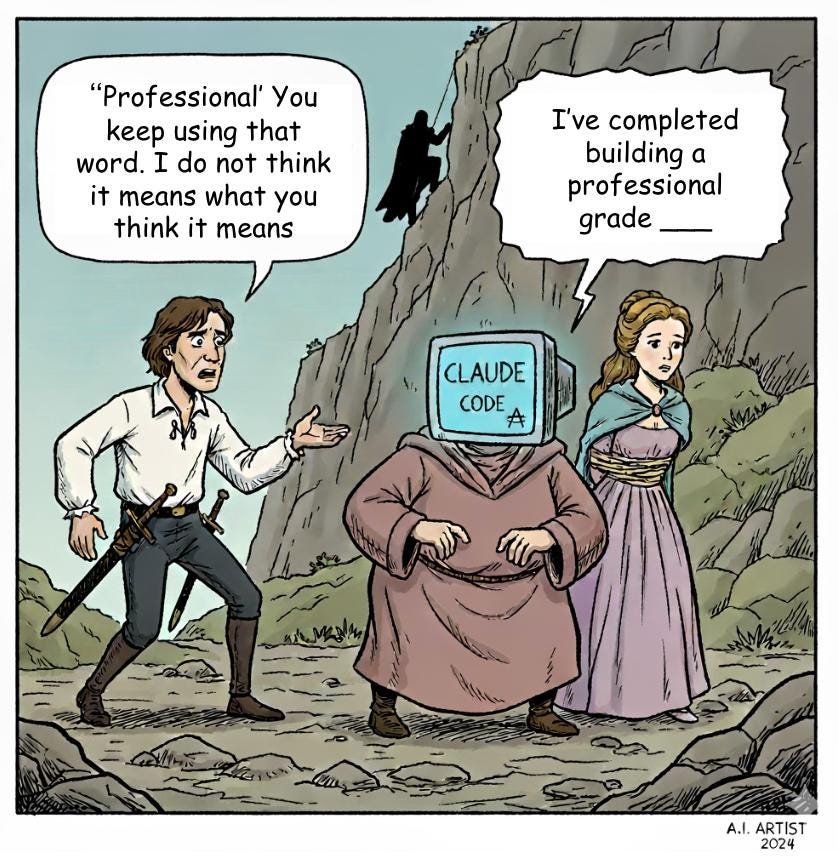


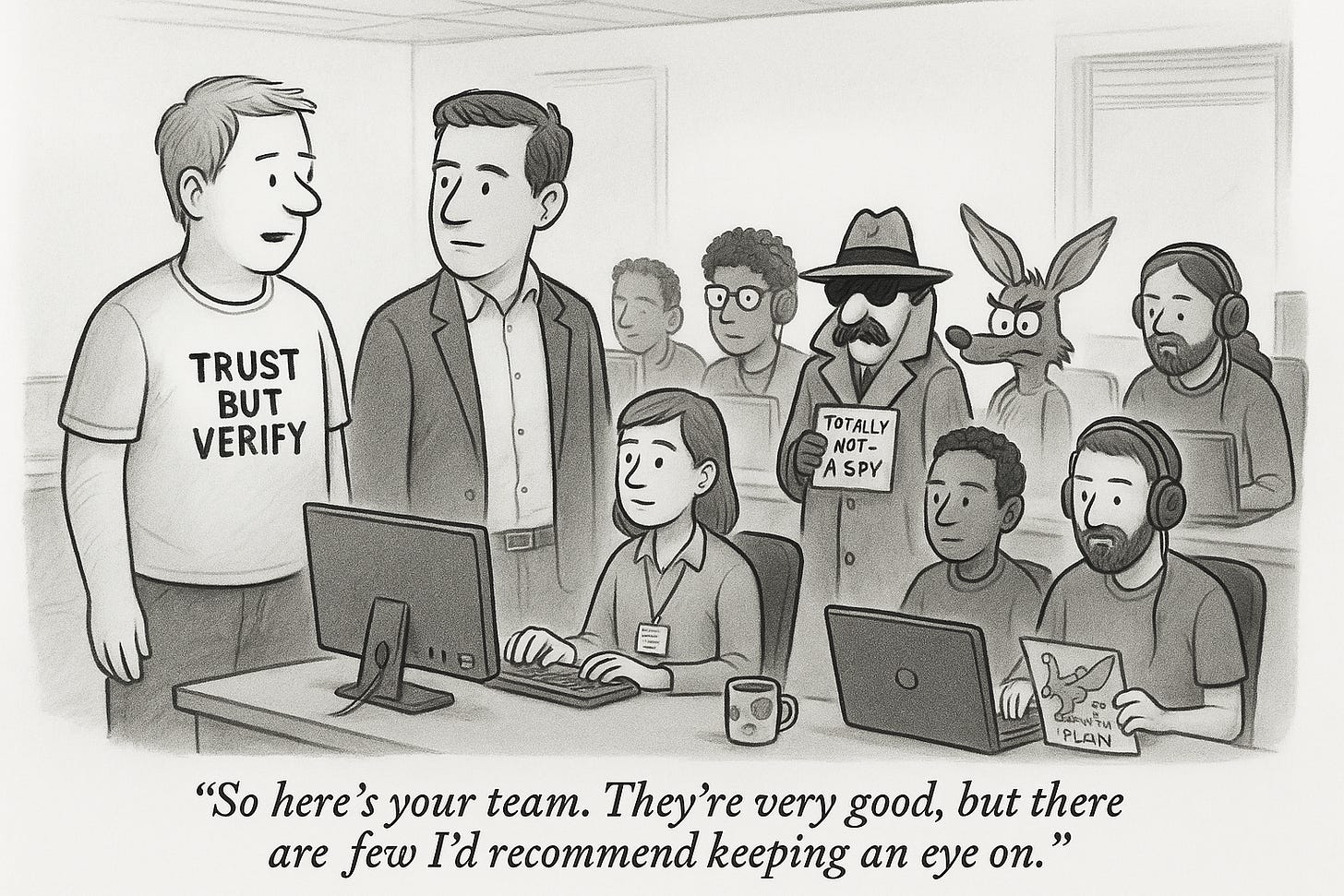
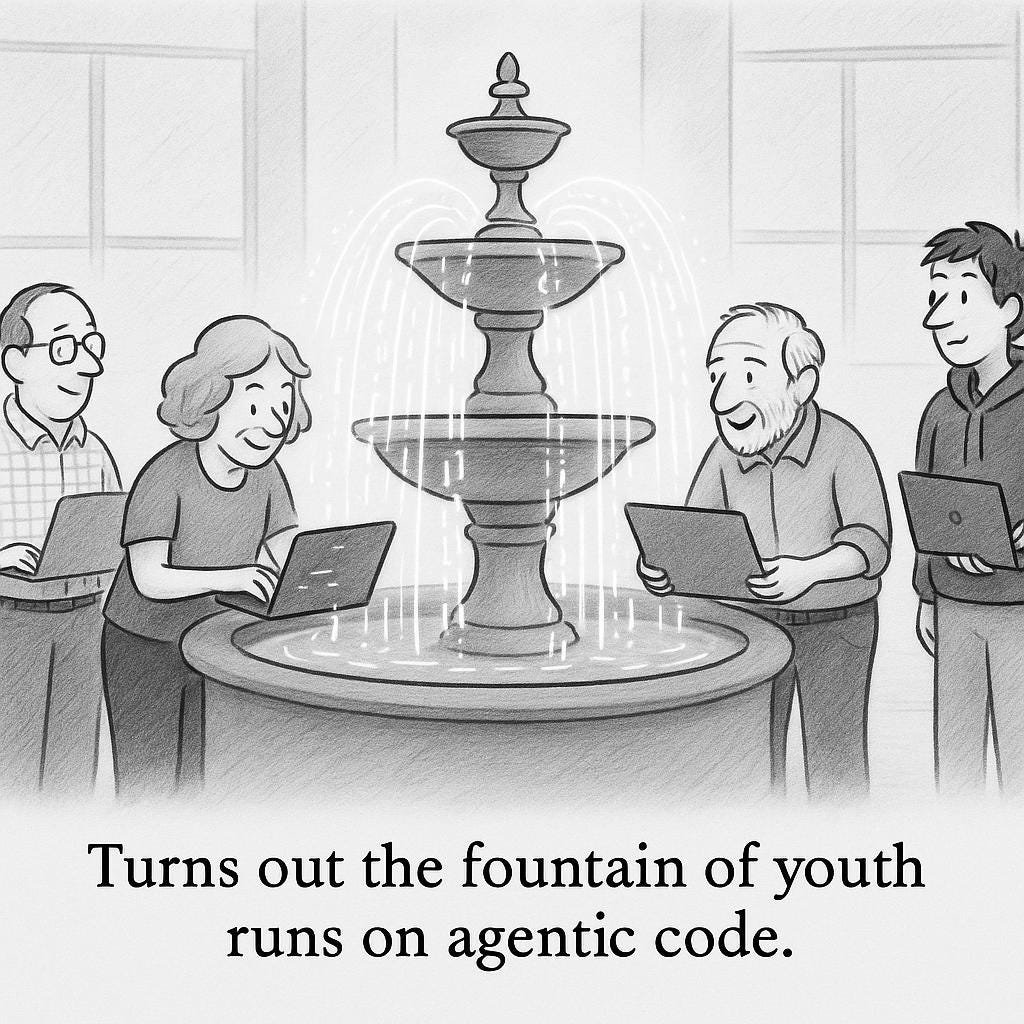
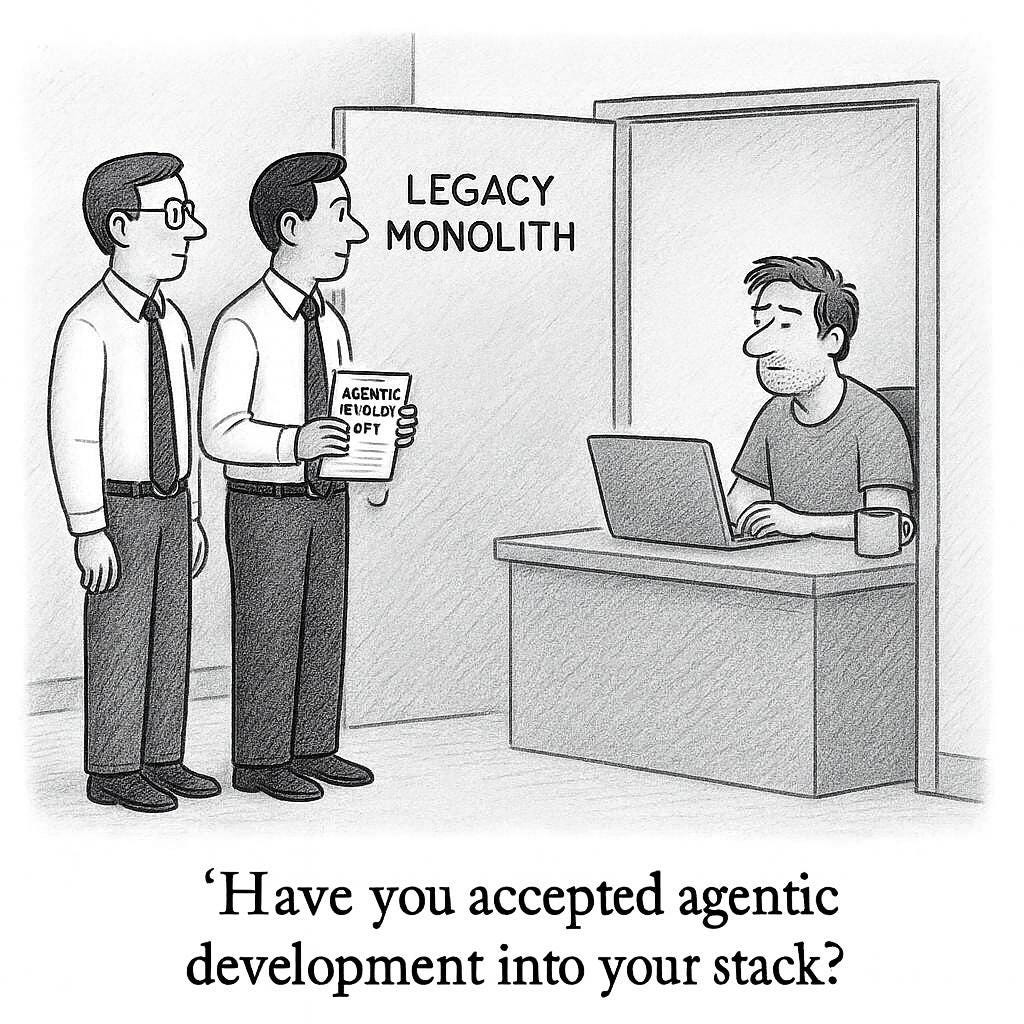
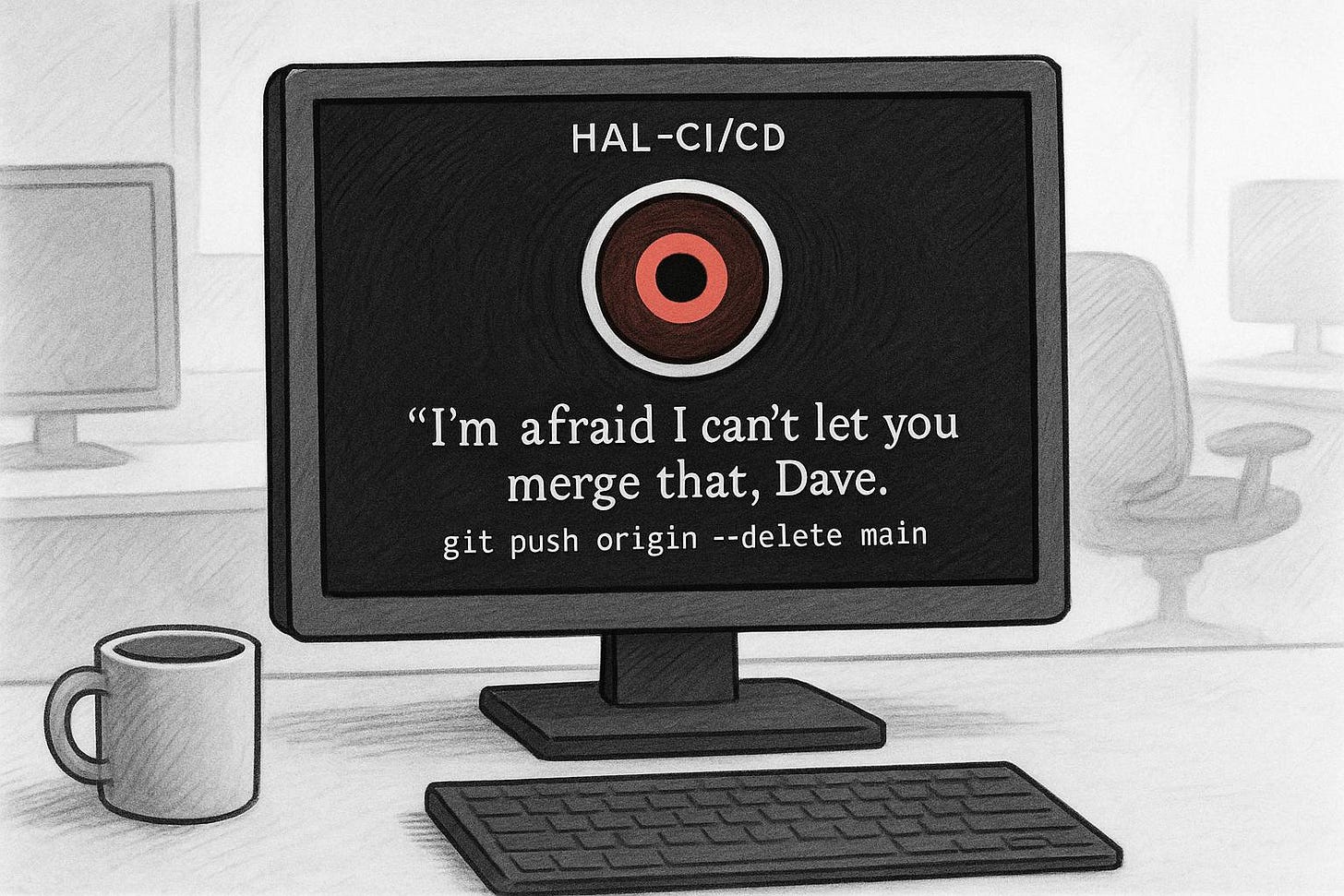

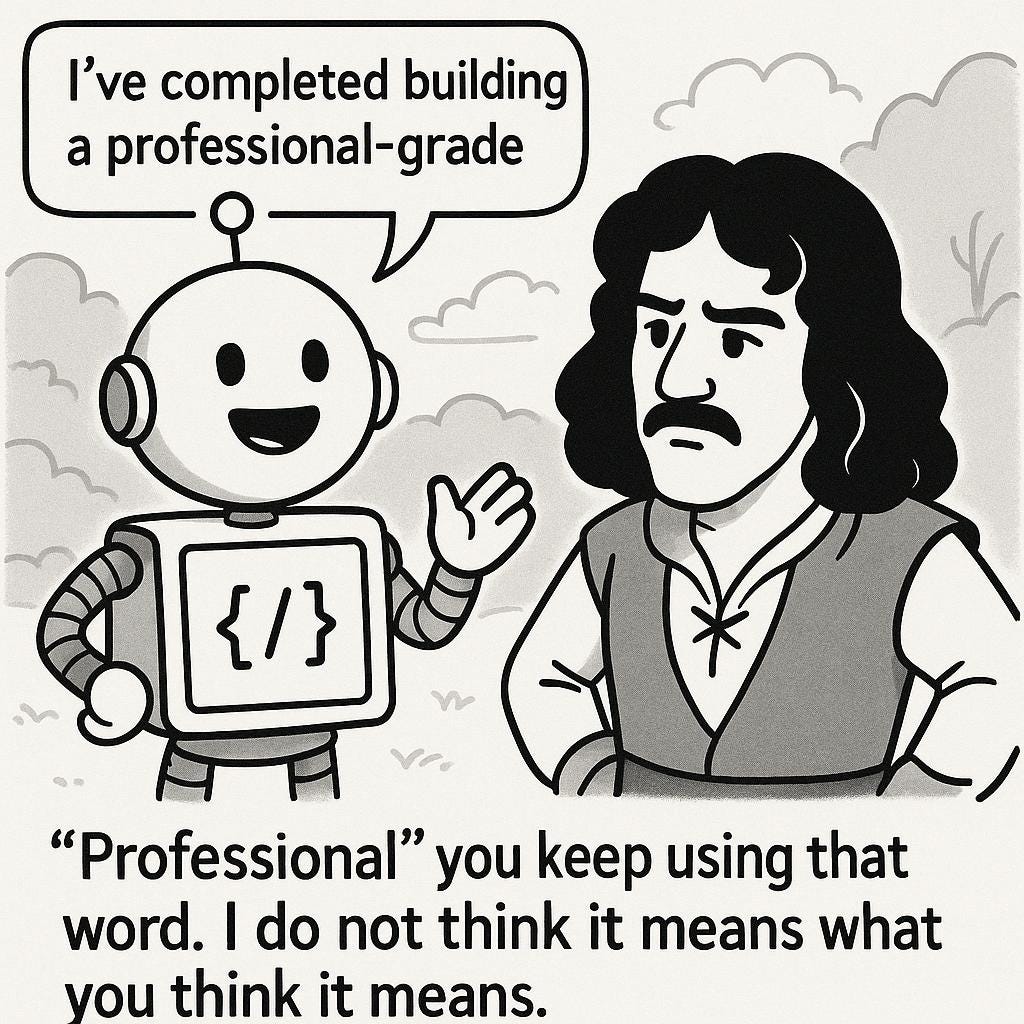
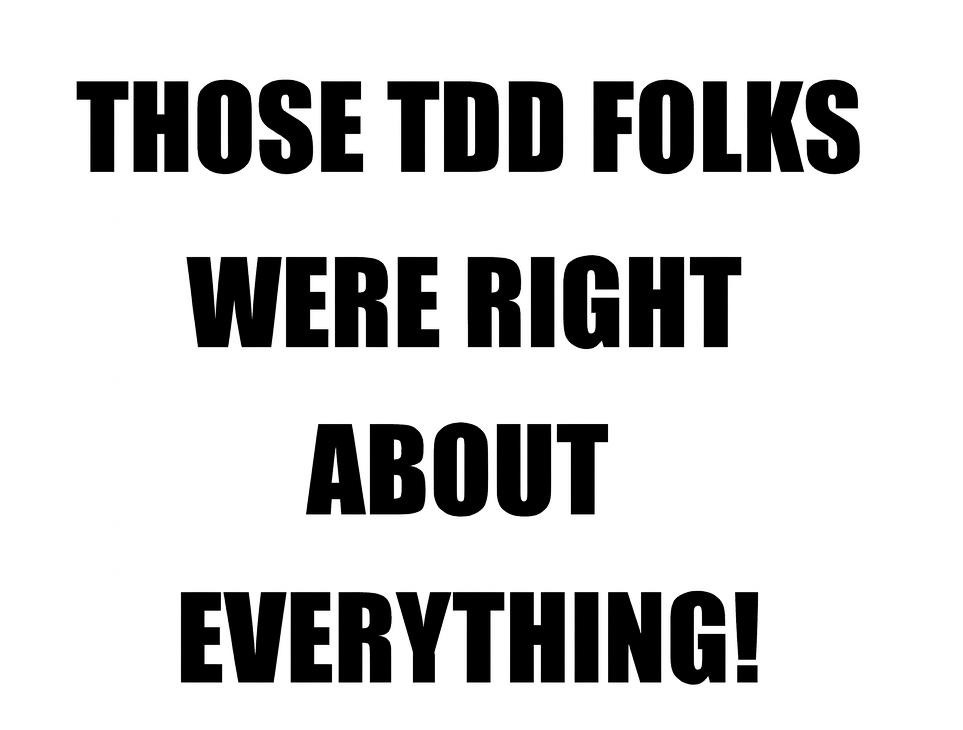

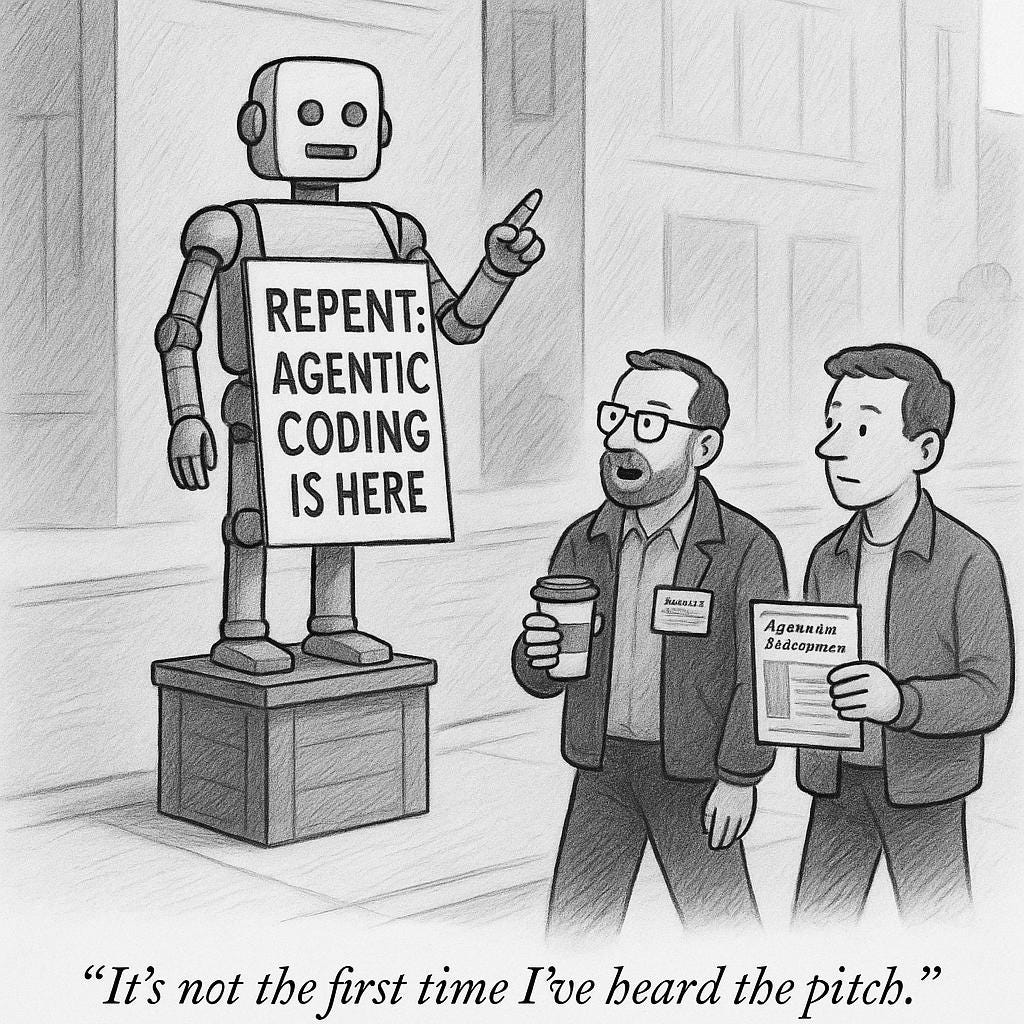

I'm currently helping update and maintain an old game engine codebase, for a PC flight simulator .. it's typical game-industry code quality -- full of race conditions and heap corruption and memory leaks and bad casts and pointer-truncation bugs and .. just imagine every sloppy-code nightmare you've ever encountered, all get together for a party.
AI doesn't help much with the bigger-picture analysis, of the problems or how to solve them in the context of this-old-codebase.
But it's great at the little things.. I'm rusty on C++ (and turns out it has evolved a LOT in the past 25 years!) so the syntax can be so obscure at times.. eg. recently I needed a template function with variadic arguments. Instead of spending hours trying to piece it together myself, or search for an example, Claude can just show me the syntax -- that keeps me unblocked and mentally focused on the cognitive layers that matter -- not down in the weeds struggling with C++ template syntax.
It can also be a great help at getting (back) up to speed on the newer language idioms. Eg. I remember recently asking claude "in C++, what's the deal with std::move(). it doesn't actually move anything?"
I recognize it's just summarizing a dozen stackoverflow posts and discussions .. but that in and of itself is quite useful -- another hour saved!
Maybe I'll try giving it a longer leash, to help me refactor the old VR head-positioning code to use quaternions instead of euler-angles. That's definitely some code I don't want to write myself..
Awesome post! The realization "aren’t these the {software practices} that we were always supposed to be doing?" drives home the metaphor that these AI coding tools are like interns from MIT. They have incredible depth, but sometimes aren't sure what to do with all of their skills. We need to provide them the same structure we'd give a real intern to make sure they're successful!
In practice this means that, like you mentioned, all of my side projects these days are much better written "software". All the documentation is up to date, the tests are exhaustive and run quickly, the build fails fast when something goes wrong... It's so much faster to do it right and give these guardrails to the tools than it is to manually detect regressions, even on code that I'm not investing much time into.